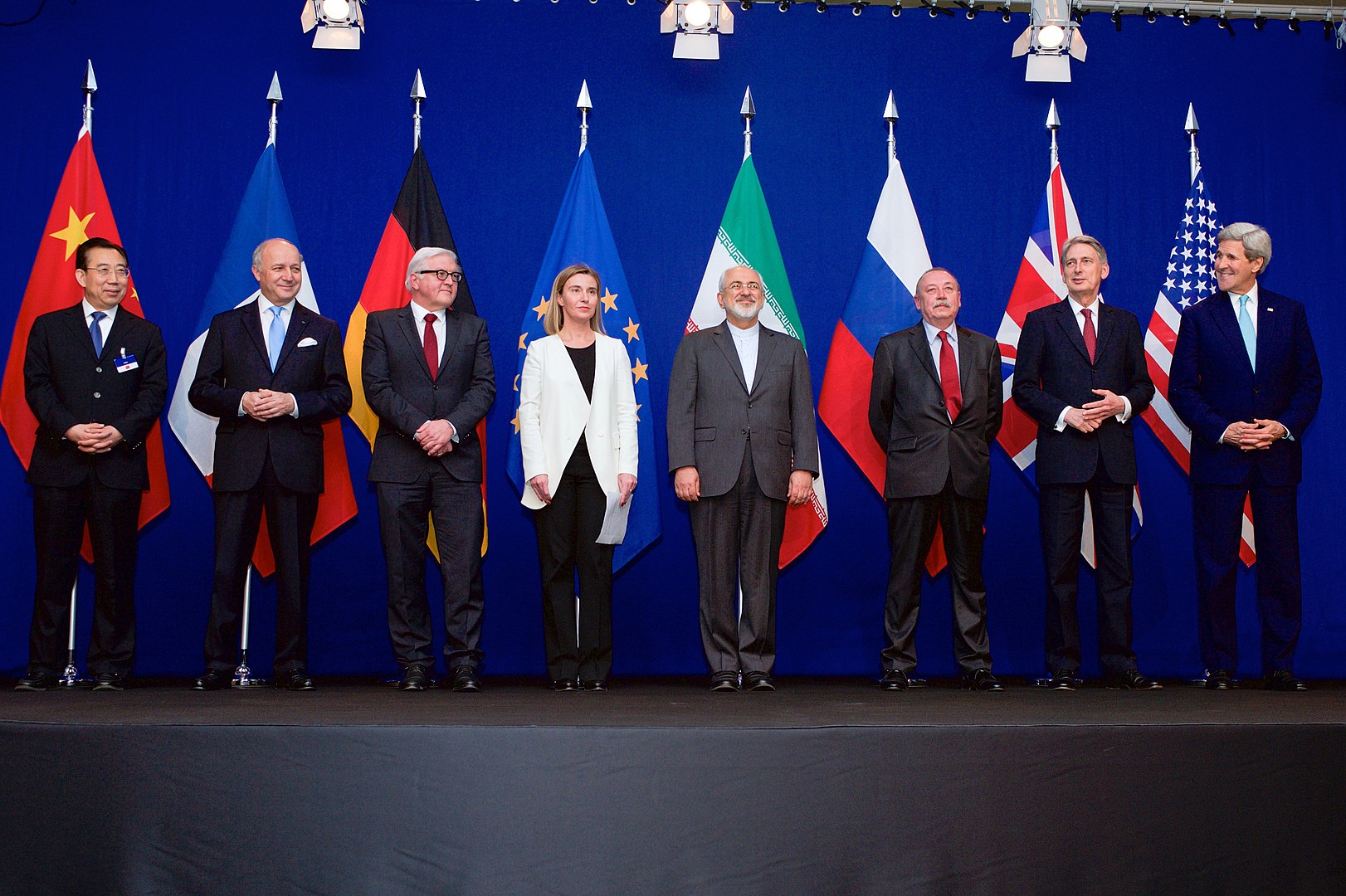Photo of Secretary of State John Kerry with P5+1 leaders and Iranian Foreign Minister Zarif following negotiations on Iran’s Nuclear Program in Lausanne, Switzerland April 2, 2015 courtesy of the U.S. State Department.
U.S. Strikes on Iran Condemned by Church, Others
Peace and international affairs experts criticized President Trump’s decision to bomb Iran in support of Israel’s war.
As soon as Israel began its war with Iran on June 13th in violation of international law, faith voices, foreign policy experts, and political figures across the political spectrum urged U.S. President Donald Trump to resist Israeli Prime Minister Benjamin Netanyahu’s calls for the United States to bomb key Iranian nuclear sites. On June 21, President Trump ordered U.S. air strikes on Iran – an illegal move under both international law and the U.S. Constitution. Neither Israel nor the United States, both nuclear powers, provided any evidence that Iran posed an imminent threat.
A truce was soon declared between Israel and Iran which has held as of this writing, but tensions remain high and the ultimate outcome remains uncertain. While the Trump Administration and Israel insist the strikes destroyed Iran’s nuclear program, other intelligence reports suggest the program was only set back a few months, and experts fear the war may only strengthen Iran’s resolve to develop nuclear weapons.
Early efforts within Congress to reassert its constitutional war powers failed June 26 when the Senate voted largely along party lines to reject a War Powers Resolution introduced by Senator Tim Kaine of Virginia.
Pope Leo XIV had warned against bombing Iran, saying on June 18 that “the temptation to have recourse to powerful and sophisticated weapons needs to be rejected.” The morning after the U.S. strikes, he In a letter organized by Churches for Middle East Peace, MOGC joined 17 ecumenical partners in urging Congress to reclaim its war powers. “No president should unilaterally decide to take the nation to war,” the letter reads. “We believe diplomacy — not unauthorized and dangerous military escalation — offers the most straightforward path to lasting peace and security in the Middle East.”
MOGC was one of 75 organizations including Muslim, Jewish, Hindu, Catholic and Protestant groups, peace, human rights, foreign policy, and Iranian American organizations to sign a joint statement calling the U.S. strikes “illegal, unconstitutional, and unproductive,” and putting them in their wider historical context: “Let’s be clear how we got here: President Donald Trump unilaterally withdrew from the Iran Deal (JCPOA) in 2018 which was working and limiting Iran’s nuclear program peacefully. The recent diplomatic efforts between the U.S. and Iran were making major progress and could have resolved Iran’s nuclear program effectively, transparently, and peacefully.”
The statement continues: “The American people do not support or want a war with Iran. Only a diplomatic resolution will safeguard U.S. interests, reflect the will of the American people, prevent Iran from acquiring nuclear weapons, and avert a catastrophic and avoidable war.”
Criticism of the strikes came from diverse quarters. After Iran suspended cooperation with the International Atomic Energy Agency, The Elders, a group of global leaders formed by Nelson Mandela in 2007, warned, “We are extremely concerned about the loss of oversight over Iran’s stockpiles of enriched uranium in light of the US strikes,” saying the U.S. strikes “have undermined nuclear diplomacy and risk fueling a new wave of proliferation of nuclear weapons in the Middle East and globally.
The Bulletin of the Atomic Scientists laid out the complexities of using bombs to stop Iran’s nuclear program, raising doubts about the intelligence used to justify the strikes, the concern that Iran will still produce a bomb, and the specter of a longer war aimed at regime change. The Back from the Brink nuclear disarmament coalition called for multilateral disarmament beginning with the United States.
Robert Kagan, a prominent proponent of the U.S. Invasion of Iraq in 2003, warned that not only would the bombing of Iran be counterproductive, but, taking place within the broader context of the Trump Administration’s defiance of constitutional checks and balances and the rights of migrants and others, he writes, “I can think of nothing more perilous to American democracy right now than going to war.”
As Pope Leo said on June 26, “After centuries of history, how can anyone believe that acts of war bring about peace and not backfire on those who commit them? … How can we continue to betray the desire of the world’s peoples for peace with propaganda about weapons buildup, as if military supremacy will resolve problems instead of fueling even greater hatred and desire for revenge?”

